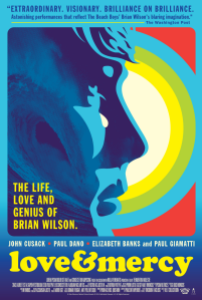 As a biopic, “Love & Mercy,” the story on the life of Beach Boys singer Brian Wilson, is a bit unusual. It passes over their surf pop rise to stardom in the early ‘60s in just the credits sequence. It jumps forward and backward in time to when Brian was both a young and middle-aged man on a whim. At times Bill Pohlad’s film is as deeply spiritual and scatterbrained as its subject.
As a biopic, “Love & Mercy,” the story on the life of Beach Boys singer Brian Wilson, is a bit unusual. It passes over their surf pop rise to stardom in the early ‘60s in just the credits sequence. It jumps forward and backward in time to when Brian was both a young and middle-aged man on a whim. At times Bill Pohlad’s film is as deeply spiritual and scatterbrained as its subject.
But upon recording “Pet Sounds,” Brian Wilson’s unusual, yet signature, masterpiece album with The Beach Boys, he explained to one of the musicians who thought the music didn’t work, “It works in my head.”
“Love & Mercy” follows Brian as a young man played by Paul Dano during the sessions for “Pet Sounds” and the unreleased “Smile” in 1966, then again in the ‘80s, now played by John Cusack. As an older man, Wilson met Melinda Ledbetter (Elizabeth Banks) while under the supervision of Dr. Eugene Landy (Paul Giamatti). Awkward, soft-spoken and timid, Cusack walks a fine line between making Wilson creepy, damaged, flat out weird or all three. Regardless, he asks Melinda out on a date after revealing his identity and in a scary scene at a barbecue makes clear to her just how terrified he is of his caretaker.
Dr. Landy explains to Melinda that Brian is a paranoid schizophrenic, and asks that if they are to become romantically involved they need to establish ground rules such that he can retain control over how Brian is cared for and behaves. What’s daring for a biopic, but not uncommon, is that in these moments we see everything from Melinda’s perspective. Her detached position challenges our notion that Brian is really the genius we know him to be, separating us from the musical history and conflict portrayed in the earlier point in his life.
And yet Dano perhaps shines the most, performing incredibly lifelike recreations of Brian’s meticulous creative process. The faded, docu-realistic camera work inside the studio shows us the gradual methodology of his genius at work. They’re fun, lighthearted scenes as dogs bark on the sound stage and Brian picks at the inside of a piano with bobby pins, but we never get the full picture or adoration for Brian’s music. Pohlad always calls attention to the failures and the mental turmoil that masked just how significant his work was. Pohlad gets a big gasp out of news that Brian’s father sold the band’s song rights for profit, or when Brian loses his mind to the noise of silverware clinking on plates. Dano sells Brian’s madness from just the neck up in a terrific scene where he’s flailing from the deep end of a pool while the band tries to hold a serious meeting.
The melodrama however comes to an unfortunate head when “Love & Mercy’s” climax aims to take us on a busy mind trip to justify Brian’s sickness. And though the ending title card confesses Brian was never as damaged as he seemed, the movie at times makes Brian out to be a mad genius who also created one of the best albums of all time in the process.
One of Wilson’s band mates however has a good description for some of the singles on “Pet Sounds”. “Even the happy songs are sad.” “Love & Mercy” is a hopeful film, dearly respectful of his subject and ultimately a crowd-pleaser, but it has a lot of hurt and honesty behind its words and melodies.
3 ½ stars